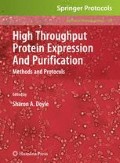Summary
The rate-limiting step in protein production is usually the generation of an expression clone that is capable of producing the protein of interest in soluble form at high levels. Although cloning of genes for protein expression has been possible for some time, efficient generation of functional expression clones, particularly for human proteins, remains a serious bottleneck. Often, such proteins are hard to produce in heterologous systems because they fail to express, are expressed as insoluble aggregates, or cannot be purified by standard methods. In many cases, researchers are forced to return to the cloning stages to make a new construct with a different purification tag, or perhaps to express the protein in a different host altogether. This usually requires identifying new cloning schemes to move a gene from one vector to another, and frequently requires multistep, inefficient cloning processes, as well as lengthy verification and sequence analysis. Thus, most researchers view this as a linear pathway — make an expression clone, try it out, and if it fails, go back to the beginning and start over. Because of this, protein expression pipelines can be extremely expensive and time consuming.
The advent of recombinational cloning has dramatically changed the way protein expression can be handled. Rapid production of parallel expression clones is now possible at relatively low cost, opening up many possibilities for both low- and high-throughput protein expression, and increasing the flexibility of expression systems that researchers have available to them. While many different recombinational cloning systems are available, the one with the highest level of flexibility remains the Gateway system. Gateway cloning is rapid, robust, and highly amenable to high-throughput parallel generation of expression clones for protein production.
Access this chapter
Tax calculation will be finalised at checkout
Purchases are for personal use only
References
Hartley, J. L., Temple, G. F., and Brasch, M. A. (2000) DNA cloning using in vitro site-specific recombination. Genome Res. 10, 1788–1795.
Kapust, R. B., Tozser, J., Fox, J. D., Anderson, D. E., Cherry, S., Copeland, T. D., and Waugh, D. S. (2001) Tobacco etch virus protease: mechanism of autolysis and rational design of stable mutatnts with wild-type catalytic efficiency. Protein Eng. 14, 993–1000.
Studier, F. W. (2005) Protein production by auto-induction in high density shaking cultures. Protein Expr. Purif. 41, 207–234.
Shine, J. and Dalgarno, L. (1975) Determinant of cistron specificity in bacterial ribos-omes. Nature 254, 34–38.
Horton, R. M., Cai, Z. L., Ho, S. N., and Pease, L. R. (1990) Gene splicing by overlap extension: tailor-made genes using the polymerase chain reaction. Biotechniques 8, 528–535.
Luckow, V. A., Lee, S. C., Barry, G. F., and Olins, P. O. (1993) Efficient generation of infectious recombinant baculoviruses by site-specific transposon-mediated insertion of foreign genes into a baculovirus genome propagated in Escherichia coli. J. Virol. 67, 4566–4579.
Kapust, R. B., Tozser, J., Copeland, T. D., and Waugh, D. S. (2002) The P1′ specificity of tobacco etch virus protease. Biochem. Biophy. Res. Commun. 294, 949–955.
Esposito, D., Gillette, W. K., and Hartley, J. L. (2003) Blocking oligonucleotides improve sequencing through inverted repeats. Biotechniques 35, 914–920.
Hammarstrom, M., Hellgren, N., van den Berg, S., Berglund, H., and Hard, T. (2002) Rapid screening for improved solubility of small human proteins produced as fusion proteins in Escherichia coli. Protein Sci. 11, 313–321.
Acknowledgments
The authors would like to thank Kelly Esposito and Dr. William Gillette for assistance in protocol development. Some Gateway adapter PCR protocols are derived from original work by Dr. David Cheo and Dr. Jim Hartley. This work has been funded in whole or in part with federal funds from the National Cancer Institute, National Institutes of Health, under contract N01-CO-12400. The content of this publication does not necessarily reflect the views or policies of the Department of Health and Human Services, nor does mention of trade names, commercial products, or organizations imply endorsement by the U.S. Government.
Author information
Authors and Affiliations
Editor information
Editors and Affiliations
Rights and permissions
Copyright information
© 2009 Humana Press, a part of Springer Science+Business Media, LLC
About this protocol
Cite this protocol
Esposito, D., Garvey, L.A., Chakiath, C.S. (2009). Gateway Cloning for Protein Expression. In: Doyle, S.A. (eds) High Throughput Protein Expression and Purification. Methods in Molecular Biology, vol 498. Humana Press. https://doi.org/10.1007/978-1-59745-196-3_3
Download citation
DOI: https://doi.org/10.1007/978-1-59745-196-3_3
Publisher Name: Humana Press
Print ISBN: 978-1-58829-879-9
Online ISBN: 978-1-59745-196-3
eBook Packages: Springer Protocols

